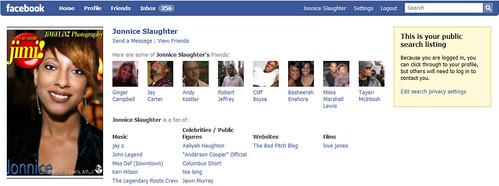There are a plethora of stories that emphasize the importance of online reputation management. So if you have read any of those, you can disregard this post because this is just going to reiterate that point. However, for those that aren’t aware, this post is for you.
With so many social networks buzzing online, for some, it’s getting harder and harder to differentiate between the networks that are joined for professional purposes and those that are joined for social purposes. In the PR profession, I’m constantly monitoring the online activity of not just my clients, but my personal activity. In doing so, I have to scrutinize the activity and online exchange of my friends, colleagues, clients. Additionally, I also have to watch the activity of their extended network to ensure that certain branding initiatives aren’t compromised by a temporary bout of Tourette syndrome.
When engaging in online discussions, you have to consider several factors:
1) What is the main purpose or interest in which the social network was created?
2) What’s your purpose for joining the network?
3) What types of exchanges exist on the network and are these the type of exchanges that support your goals?
4) Is your profile and communication within the network public or private?
5) What is the reputation of the friends or colleagues that you’ve connected within the network? Based on their conversation, what’s their purpose for joining the network?
After answering the above questions, you may want to take time to do a full assessment of the social networks that you belong to and how you interact within those circles. And then after doing that, you should do an internet search of yourself to see how many of your public profiles are visible online. Are you content with what you see? If not, the beginning of the year is a great time to do a Social Media Makeover. Take time to separate your professional online identity from your personal one. Or at the very least, ensure that your personal online profiles are private (only visible with your permission).
To illustrate this point, I did a search of my online profiles in Twitter and Facebook. Below are the images that will appear in any public search by anyone who isn’t an approved friend or within either of those two networks. Since Twitter has been dubbed the virtual watercooler for conversation, it’s a little more difficult to police some of those candid discussions, which is why my updates are protected. Conversations on Twitter can range from politics to online flirting, depending on who you follow and who follows you. Likewise on Facebook, some profile pictures do not always match conversation topics. For instance, the conversation may be about animal cruelty or becoming a vegan and the most vocal comments may come from a member whose profile picture has them posing with a full-length fur coat.
The social media phenomenon brings a new meaning to the phrase, “You can’t judge a book by its cover.” However, with Facebook, can you?








0 comments:
Post a Comment